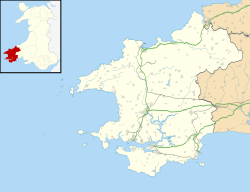Castlemartin Training Area
| Castlemartin Training Area | |
|---|---|
| Castlemartin, Pembrokeshire | |
 Western Walls | |
| Coordinates | 51°37′51″N 4°58′47″W / 51.630895°N 4.979633°W |
| Type | Training Area |
| Site information | |
| Owner | Ministry of Defence |
| Operator | |
| Controlled by | Defence Infrastructure Organisation[1] |
| Site history | |
| Built | 1938 |
| Built for | War Office |
| In use | 1939-1946 1951-Present |
The Castlemartin Training Area is located at Castlemartin in Pembrokeshire and covers 2,429 hectares (6,000 acres)[2] of land in South Western Wales. It is owned by the Ministry of Defence (MoD) and is located within the Pembrokeshire Coast National Park.
The ranges are active for 44 weeks of the year and when in use can include a coastal exclusion zone of some 12 nautical miles (22 km) off the coast, or as little as 3 nautical miles (5.6 km) depending on weapons systems/munitions being used.[3][4]
History
The Castlemartin Training Area was established in 1938[5] from deserted and inhabited farmlands and from the ruins of the Cawdor Estate. The ranges were abandoned by the military just after the Second World War, but were re-instated in 1951 when the Korean War started.[6] In 1961 there was a shortage of suitable tank training areas in the Northern part of Germany for the then recently reactivated German Tank Units. The British Army of the Rhine (BAOR), extensively used the ranges at the Bergen-Hohne Training Area which totalled 72,000 acres (29,000 ha) as their training demands could not be met by the short acreage available in the United Kingdom. Therefore a NATO accordance was agreed in Paris whereby the fledging German forces could use the 5,000-acre (2,000 ha)[note 1] range at Castlemartin.[7] This relationship between the German Armoured Units and Castlemartin lasted until October 1996,[8] when after Germany reunification, additional ranges in Eastern Germany became available.[9]
The Ranges today
In 1999 the Defence Training Estate was formed and units from all over the UK and NATO have trained on the ranges.[1]
Within the Pembrokeshire Estate there are:
- Castlemartin ranges - one of the UK's armoured fighting vehicle (AFV) ranges with direct live firing gunnery exercises and armoured vehicle manoueuvres (the other being Lulworth Cove). Castlemartin is the only Defence Training Area normally available for armoured units to fire live rounds on land and littoral environments including live firing into the sea.[2]
- Royal Artillery Range Manorbier, Penally Training Camp and Templeton Airfield - air defence systems,[1]
The ranges hit the headlines in 2012 when a soldier under training there was fatally wounded. Ranger Maguire was resting in a safe area where he had removed his body armour and helmet when a stray round entered his temple.[10] The machine gun fire that was responsible for his death also put civilians at risk on neighbouring beaches although there was no report of injuries. Ranger Maguire and his unit were training for deployment to Afghanistan.[11]
The Pembrokeshire Coastal Path goes right across the range and in 2011, the MoD opened up a special diversionary route which was safer for walkers by protecting them from the range fire and preventing them for having to negotiate narrow country roads with fast moving traffic.[12]
Shooting incidents
On 14 June 2017, at approximately 18:30, a soldier of the British Army was seriously injured in what has been described as a 'major incident'.[13]
In May 2012, soldier Michael Maguire from the The 1st Battalion, The Royal Irish Regiment died in a live fire incident on the range.
Gallery
-
Castlemartin shield
-
Centurion Mk12 tank at the entrance to Merrion Camp (Castlemartin ranges).
Notes
- ^ The size of the range is now described as 6000 acres, in Hansard it is listed as 5000 acres by Mr Harold Watkinson, Minister of Defence in 1961
References
- ^ a b c "Pembrokeshire Ranges". Retrieved 15 July 2016.
{{cite web}}: Check|archiveurl=value (help) - ^ a b Dudley, Marianna (2012). An environmental history of the UK defence estate 1945 to the present. London: Continuum International. p. 72. ISBN 978-1-4411-1357-3.
- ^ "Castlemartin Firing Range" (PDF). mhpa. Milford Haven Port Authority. Retrieved 15 July 2016.
- ^ Castlemartin Ranges - Home
- ^ "Castlemartin Pembrokeshire" (PDF). Ministry of Defence. Retrieved 11 January 2015.
- ^ "DTE Pembrokeshire" (PDF). gov.uk. Ministry of Defence. p. 2. Retrieved 15 July 2016.
- ^ "Visiting Forces (Application of Law)". Hansard Millbank Systems. 19 July 1961. Retrieved 15 July 2016.
- ^ Childs, David (2012). Britain since 1945: a political history (7th ed.). New York: Routledge. p. 267. ISBN 978-0-415-51952-6.
- ^ Turner, Robin (27 March 2013). "When German troops and tanks invaded Wales". Wales Online. Retrieved 15 July 2016.
- ^ Molloy, Mark (12 March 2013). "British soldier 'unlawfully killed' by stray bullet at Army shooting range". Metro. Retrieved 15 July 2016.
- ^ "Wales tourist beach 'risked being sprayed with machinegun fire'". The Telegraph. 8 March 2013. Retrieved 15 July 2016.
- ^ "Castlemartin access project scoops MOD's top environmental award". Tenby Today. 18 November 2011. Retrieved 15 July 2016.
- ^ "'Ongoing incident' at MOD Castlemartin firing range". BBC News. Retrieved 14 June 2017.



